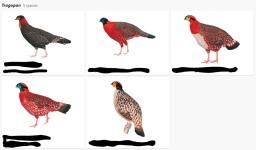l_raty
laurent raty
This claim is really misleading, as at least one of those was a change due to a taxonomic lump, not just being erased "for the hell of it".
One name disappeared as the result of a lump indeed. There is no real 'renaming' happening in a split or lump, as the entities that are named in your list before and after the change correspond to different taxonomic concepts. (Even if, to Joe Public, it may seem like the bird in his backyard got 'renamed', this is not really what happens.) It makes sense to expect that using different names for different concepts will help communication. Multiplying the names that are used for the same concept, on the other hand, can only hamper communication.
In the other cases, IOC switched from one existing name (which happened to be eponymous) to another existing name, which was perceived as being in wider use. Nothing was renamed -- no new names were created. None of these changes is remotely comparable to the gratuitous scrapping of a name that has been in universal use for over a century, and is universally understood.
If you do not take splits and lumps into account, the 'constant flux', in which names are supposed to be, is actually very limited -- and has probably been close to zero in N America in recent decades.
I never said they were erased for the hell of it. I only stated it as a FACT that they were erased. I even explicitly said that the IOC has no policy towards erasing (they claim to have a neutral stance), but it's clear those 5 eponyms are gone.
But you only looked at the two last updates. As a matter of fact, there are 832 names with an 's in the last IOC 13.2; there were 767 in the original Gill & Wright list of 2006. The number of eponymous names has been increasing over the last two decades (i.e., eponymous names have been given to taxa being split), not the opposite.









